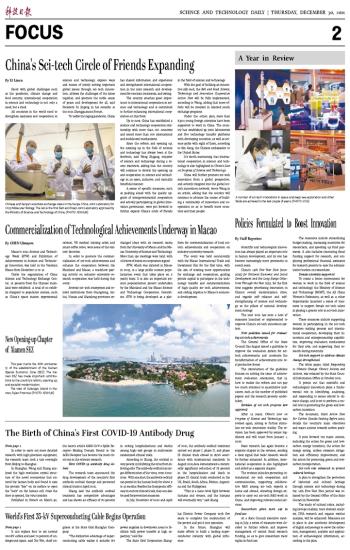
The threat of the novel coronavirus has entered its third winter. In the face of the global pandemic and the the virus variant, the world's demand for a COVID -19 antibody drug has become more and more urgent.
China's first home -developed COVID-19 antibody drug made of monoclonal antibodies BRII-196 and BRII-198 was approved for marketing on December 8. The treatment, co-developed by Tsinghua University, the Third People's Hospital of Shenzhen and Brii Biosciences, has a neutralizing activity against the Omicron variant.
The drug showed excellent safety and protection effects in international multi-center trials, according to Professor Zhang Linqi, who leads the research and development of the drug at Tsinghua University's School of Medicine.
Zhong Nanshan, China's renowned respiratory disease expert, said it might be the most effective antibody drug so far and will be of great value to promote worldwide.
Fishing for antibodies
After 30 years of studying HIV -1 pathogenesis, vaccines and human viral pathogens such as MERS -CoV, SARS-CoV-1 and SARS-CoV-2, Prof. Zhang realized that the novel coronavirus study must start as soon as possible.
At the very beginning of 2020, in a Tsinghua University laboratory, he teamed up with his old partner Wang Xinquan, a biophysics professor at Tsinghua, and began studying the synthesis of the novel coronavirus surface protein gene sequence on January 15 that year.
However, finding the antibodies produced by B lymphocytes would be like finding a needle in a haystack. He realized it was necessary to create a "bait" of specific protein with extremely high similarity to the surface protein of the novel coronavirus, to "fish" out the monoclonal antibody.
Six days after testing during the Chinese lunar new year, protein reagents had been developed and sent to the Third People's Hospital of Shenzhen, where blood samples from recovered patients of COVID-19 were kept. Researchers worked 24/7 until a total of 206 strains of monoclonal antibody with high efficiency and neutralization were successfully "fished" from the blood B cells.
Finding keys to unlock the antivirus mechanism
There are many antibodies that can resist the novel coronavirus, but finding the most effective is the tricky part. "It's like trying to pick out the most valiant 'warriors.' Finding the most effective antibody is the guarantee for the development of high-efficiency monoclonal antibody drugs for the treatment and prevention," said Zhang, while screening high-efficiency monoclonal antibodies.
On March 5, the team identified the highly effective neutralizing antibody P2C-1F11 (later named BRII-196) for the first time. Deciphering the antiviral mechanism of antibodies became the next focus of research. See page 2
From page 1
In order to carry out more detailed research with high-precision equipment, the research team took a taxi overnight from Beijing to Shanghai.
In Shanghai, Wang and Zhang analyzed the high-resolution crystal structure of the novel coronavirus that entered the human body and found it uses the protein "key" on its surface to open the "lock" on the human cell. Once the door is opened, the virus invades.
Published in Nature on March 30, the team's article SARS-CoV-2 Spike Receptor-Binding Domain Bound to the ACE2 Receptor has become the most cited one in the relevant research.
First COVID-19 antibody drug debuts
The research team announced the drug development of the country's first antibody cocktail therapy and promoted clinical trials in April 2021.
Zhang said the antibody cocktail treatment has competitive advantages and has shown an efficacy of 80 percent in cutting hospitalizations and deaths among high-risk groups in multicenter randomized clinical trials.
According to Zhang, the cocktail is very potent in inhibiting the virus from infecting cells. The antibody cocktail can target different sites of the virus, even it mutates. With one shot, the antibody cocktail can persist in the human body for about 9 to 12 months. Besides the therapeutic efficacy in current clinical trials, they can also be used for prevention measures.
In July, December of 2020 and April of 2021, the antibody cocktail treatment carried out phase I, phase II, and phase III clinical trials abroad in strict accordance with international standards. In August 2021,data demonstrated a statistically significant reduction of 78 percent in the hospitalisation and death in phase III clinical trials conducted in the US, Brazil, South Africa, Mexico, Argentina and the Philippines.
"This is a nano-level fight between humans and viruses, and the humans will eventually win," said Zhang.


 Next
Next




